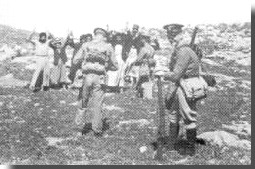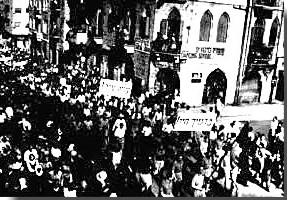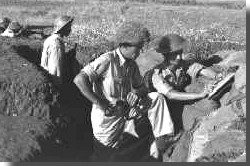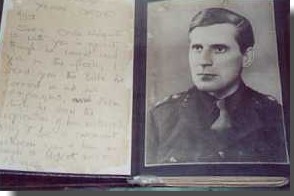L a s t i n g L e g a c y
A f t e r m a t h
A f t e r m a t h
A f t e r m a t h
The Revolt Ends
photo caption
British troops with captured Arab rebels. During 1936-39 the Yishuv suffered 547 killed or murdered.13
Photo courtesy of the Imperial War Museum, London

At the time of Wingate's departure, a sense of optimism was growing in the Yishuv. During the spring of 1939 the violence subsided as the last guerilla bands were shredded in battle, and their supporters were arrested or co-opted. This pressure resulted in the alienation of the Arab population from the rebels and they began to ignore calls to continue the rebellion. Instead some began to openly support British and Jewish military efforts, providing intelligence and fighting rebel bands. The remaining guerillas were killed or arrested, the survivors fleeing across the borders. The last commander of the revolt was killed by British troops after receiving information on his movements from Jewish and Arab sources. The violence was ended by the aggressive operations of the SNS, the growing skill of the Haganah, and the large British troop presence, all supplied by good intelligence (the Haganah and British military intelligence cooperating). By the summer of 1939 the rebellion faded into pure criminal activity, and British troop strength gradually fell.
Zionist resistance was not broken, no Jewish settlements lost, nor did the Yishuv fracture politically. Indeed, Arab violence and the continuation of rejection of peaceful compromise would solidify the view it would only be through action and deterrence that Zionism could achieve the objective of statehood. The Haganah's success in both coping with the rebellion and continuing its efforts was inspiring, and "a national consciousness was forged in the minds of the people, and a wave of healthy optimism arose, a surge of faith in themselves, a genuine feeling that their roots had gone deeper and that a tine of organic growth had come, suckled by the land and bearing fruit."2 The Haganah was becoming more professional in their military endeavors and organization, growing in large part due to Wingate. But more challenges to overcome in the face of disaster lay in that same year of 1939. The government commission examining Palestine issued a White Paper in May. Support for a Jewish homeland was no longer to be policy, Jewish immigration was to be banned, and refuge to those fleeing Nazi persecution was to be denied. With Europe edging toward war, Britain was trying to ensure the strategic Middle-East remained politically secure. The successful military actions helped to bring the Arab Revolt to a close and with the White Paper demonstrated Britain was still a power in the region, thus ensuring Arab governments remained neutral as the World War began. And successful military action with the White Paper fueled Jewish anger, and with the need to cooperate with the British in the war, much bitterness. The White Paper "became the motive force of Jewish determination to end British rule in Palestine."3
photo caption
Protests in Tel Aviv against the issuing of the colonial White Paper of 1939. Despite protests, a war, and genocide, the restricting of immigration would remain British policy until 1947.
Photo courtesy of the
World Zionist
Organization, Israel
Lessons Learned

 The Jewish state, Israel, was born to a tumultuous beginning. During Israel's War of Independence (1947-49) the fledgling state struggled to survive its first year as Palestinian Arabs, and then armies from the Arab states attempted to strangle the Jewish state in its infancy. In a repeat of the 1930s, in the face of proposals to divide British Palestine between a Jewish and Arab nation (which was accepted by the Yishuv), the vast majority of the Arab Muslim world refused to accept this compromise and make peace with a Jewish presence. Instead the Arab world called for a religious holy war and extermination of the Jews in Palestine. During the war, the critical situation was not overcome until a more offensive strategy was undertaken, taking the war to the enemy. Employing surprise, speed, and mobility, moving away from a defensive mindset became the way to achieve survival. This was due to Wingate who imparted his bold ideas & achievements upon the Haganah, and others like Sadeh who codified them. Indeed, after Liddell Hart, Israeli military leaders believe the impact of Orde Wingate has been the greatest significance on Israeli military theory and practice.4 As one of Israel's Army Chief-of-Staff's put it, "His basic contribution - and it was a great one - was to teach us that warfare is a science and an art at the same time. He was the perfect example of the military man, being himself the excellent combination of scientist and artist."5
The Jewish state, Israel, was born to a tumultuous beginning. During Israel's War of Independence (1947-49) the fledgling state struggled to survive its first year as Palestinian Arabs, and then armies from the Arab states attempted to strangle the Jewish state in its infancy. In a repeat of the 1930s, in the face of proposals to divide British Palestine between a Jewish and Arab nation (which was accepted by the Yishuv), the vast majority of the Arab Muslim world refused to accept this compromise and make peace with a Jewish presence. Instead the Arab world called for a religious holy war and extermination of the Jews in Palestine. During the war, the critical situation was not overcome until a more offensive strategy was undertaken, taking the war to the enemy. Employing surprise, speed, and mobility, moving away from a defensive mindset became the way to achieve survival. This was due to Wingate who imparted his bold ideas & achievements upon the Haganah, and others like Sadeh who codified them. Indeed, after Liddell Hart, Israeli military leaders believe the impact of Orde Wingate has been the greatest significance on Israeli military theory and practice.4 As one of Israel's Army Chief-of-Staff's put it, "His basic contribution - and it was a great one - was to teach us that warfare is a science and an art at the same time. He was the perfect example of the military man, being himself the excellent combination of scientist and artist."5
Wingate left his legacy on tactics and command style in several ways to the future Israeli army. Stated Yigal Allon, one of the Haganah leaders who learned from him (and would go on to become the first commander of the Israeli army), imagination and boldness in action were some of the favorite traits that greatly impacted the developing military doctrine of the Haganah. Other tactics included stressing surprise and speed, recognizing their importance psychologically on the enemy as well as the practical effect. This also meant being accustomed to moving & fighting at night especially. And to be tenacious in self-defense by using retaliatory raids, to take the fighting to the enemy. Wingate was meticulous and careful in planning before operations, yet at the same time there was a willingness to improvise, and to recognize the necessity of doing so. With this was recognition of the importance of giving subordinates the power to use their initiative, and so training them to be skilled small-unit leaders. Another important skill was in knowing when to operate a multiple of small units and in recognizing the need when to concentrate ones forces.6
photo caption
Haganah troops during the War of Indepen-
dence. Heading the Haganah then was Yigal Allon & Moshe Dayan was a unit commander. Others who learned from Wingate & would go on to famous deeds include Yitzhak Rabin, Avraham Yoffe & Israel Carmi.
Photo courtesy of the
Israel Government
Press Office
 The Haganah learned from Wingate about the commander setting a personal example. This included leading from the front to having physical endurance, to there being no special privelages between officers & enlisted ranks. And that encouragement would be drawn from the commander's personal example. Wingate insisted on strong practical discipline with a sense of purpose. This addressed the motivation for fighting, the ideological reasons, which would help make a stronger motivated fighting force. "Wingate's second greatest contribution was to make us realize something which we had felt but had never been consciously aware of before, that our faith in our cause and our morale resulting there from is an invincible weapon,"7 as another army commander stated. Ensuring the men knew the basic purpose of the plan was important, for Wingate believed having the force understanding the plan of the mission would improve the thinking & action of the force.8 Sadeh himself paid him the compliment of learning the best course of action sometimes meant having to think about having a good counter-offense, to being bold in ideas. He stated, "I have learnt from Wingate that a soldier has to think and not act like sheep. We could hardly say that we learned from him a certain system, because he always found a new system that fitted in with the new situation."9
The Haganah learned from Wingate about the commander setting a personal example. This included leading from the front to having physical endurance, to there being no special privelages between officers & enlisted ranks. And that encouragement would be drawn from the commander's personal example. Wingate insisted on strong practical discipline with a sense of purpose. This addressed the motivation for fighting, the ideological reasons, which would help make a stronger motivated fighting force. "Wingate's second greatest contribution was to make us realize something which we had felt but had never been consciously aware of before, that our faith in our cause and our morale resulting there from is an invincible weapon,"7 as another army commander stated. Ensuring the men knew the basic purpose of the plan was important, for Wingate believed having the force understanding the plan of the mission would improve the thinking & action of the force.8 Sadeh himself paid him the compliment of learning the best course of action sometimes meant having to think about having a good counter-offense, to being bold in ideas. He stated, "I have learnt from Wingate that a soldier has to think and not act like sheep. We could hardly say that we learned from him a certain system, because he always found a new system that fitted in with the new situation."9
photo caption
Wingate's bible on display at Ein Herod Kibbutz. During the War of Independence, the settlement Ramot Naftali (founded by British Army veterans) was under siege. Lorna Wingate gave her husband's bible to some of its women defenders who were being evacuated. It had been with him from Palestine to Burma. A message was written by her on the inside cover stating Orde was with them in spirit.
Personal photo
Struggling
Back in England in 1939, Wingate struggled to have his personal record changed. He received a negative personal report endorsed by both the commanding intelligence officer in Palestine & General Haining. The report stated that despite his gifts he was basically not an officer committed to serving national interests, and that his actions had negated any possible success. Wingate exercised his right and appealed to the Army Council to argue his case. He wrote stating his career always demonstrated success and that while he supported the Jewish cause, this did not mean his loyalty to the British Crown was weak. The formal process was first to the generals on the Army Council for consideration, then to Secretary of State for War, finally to the King with recommendation if the appeal was believed legitimate.
Upon the outbreak of war that September of 1939, the new Chief of the Imperial General Staff (army commander) was now the same general officer who had been impressed by Wingate that October day outside at Tiberias, General Ironside. The Army Council decided not to recommend a course of action, and this was a probable career-ending move if the appeal proceeded. It was Ironsides who recommended to the Secretary of State for War that the appeal should not be forwarded to the King. He wrote instead that Wingate was probably badly handled in Palestine, and was a valuable officer. He suggested that Wingate be given the opportunity to drop his appeal writing, "I feel that there is nothing in the report which prevents Captain Wingate from being employed for the good of the Army. I think he can rest assured that his merit is thoroughly known."12 The War Ministry sent a letter to Wingate stating that the appeal had failed, but stressed his merits were appreciated, and asking if he truly wished the appeal to go forward. General Ironside had a talk with Wingate who was persuaded to withdraw the appeal, probably saving his career.

 During the first year of WWII, Wingate languished in command of an anti-aircraft unit in England. He was feeling frustrated at his passive role so far in the war. Under the German threat of invasion, small units were created to counter expected enemy saboteurs and parachutists. Ironside gave Wingate permission to form one of these. Wingate was among several who wrote papers proposing to use Jewish manpower and expertise under British cadre to form military units. These proposals were rejected for fear the Arab, Muslim world would interpret this as a plan to allow Jewish domination of Palestine. The idea of raising Jewish armed forces for Britain came close to fruition several times but was
never approved,
adding to his frustration.
During the first year of WWII, Wingate languished in command of an anti-aircraft unit in England. He was feeling frustrated at his passive role so far in the war. Under the German threat of invasion, small units were created to counter expected enemy saboteurs and parachutists. Ironside gave Wingate permission to form one of these. Wingate was among several who wrote papers proposing to use Jewish manpower and expertise under British cadre to form military units. These proposals were rejected for fear the Arab, Muslim world would interpret this as a plan to allow Jewish domination of Palestine. The idea of raising Jewish armed forces for Britain came close to fruition several times but was
never approved,
adding to his frustration.
Through British Zionists, the Wingates as a couple took part in meetings with important Jewish and British leaders. These included Weizmann & Ben-Gurion, and others sympathetic or interested such as General Ironsides, military expert Basil Liddell Hart, and Minister of Parliament Winston Churchill. Orde Wingate was also introduced to another Minister of Parliament and supporter of the eventual prime minister, Winston Churchill. This man whom Wingate made a deep impression upon was MP Leopold Amery. It was the summer of 1940 and the war was not going well for Great Britain. Talented men were needed, and Wingate would soon find himself going back to war.
1. Howard Sachar, A History of Israel
(New York: Alfred Knopf, 1996), 213.
2.Sachar, 216.
3. Michael Cohen and Martin Kolinsky (eds), Britain and the Middle East In The 1930s (New York: St. Martins Press, 1992), 163.
4. Trevor Royle, Orde Wingate (London: Weidenfeld & Nicholson, 1995), 173.
5. General Yigal Yadin in Israel Defense Force, Haganah Museum documents 143-12..
6. Yigal Allon, The Making of Israel's Army (New York: Universe Books, 1970), 10-11.
7. General Yigal Yadin in Haganah Museum documents 143-12..
8. Allon, 10-11.
9. Sadeh in Haganah Museum documents 80-137-3..
10. Royle, 158.
11. Christopher Sykes, Orde Wingate (New York: World Publising Company, 1959), 209.
12. Derek Tulloch, Wingate in War and Peace (London: History Book Club, 1972), 48.
13. Cohen and Kolinsky, 162.
